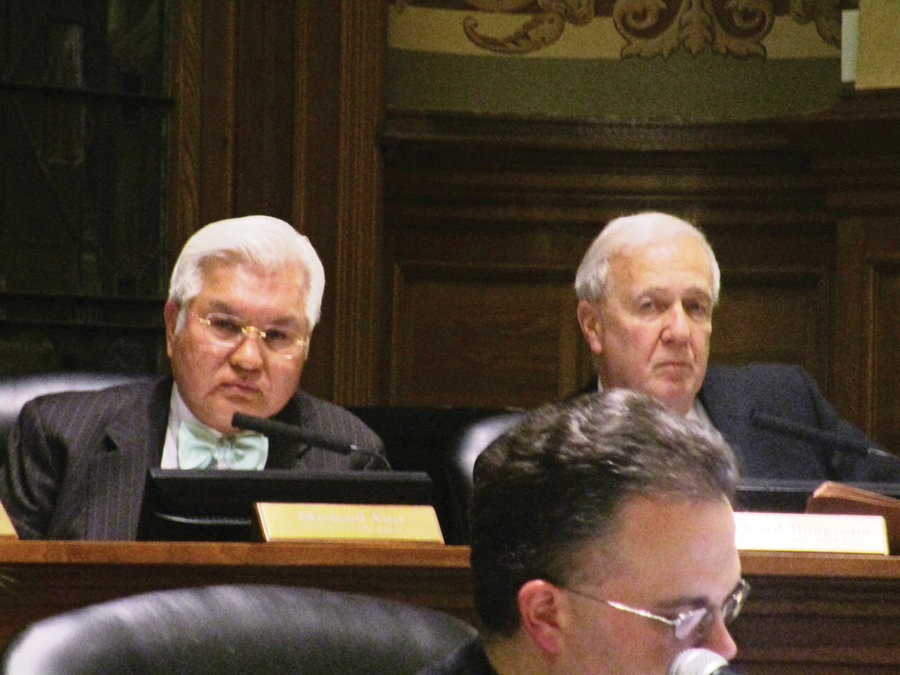Residents who attend a hearing about the controversial City Hall Annex proposed for Martin Luther King Drive during the March 11 City Council meeting will discover the project has been reduced in size, but the lease purchase arrangement between the developer and city remains the same.
The annex will be built by Brandywine Jersey City LLC through a public-private partnership with the city and the Jersey City Redevelopment Agency (JCRA).
However, the size of the structure wasn’t the cause of the controversy; the cause is the lease purchase under which the city would acquire the facility.
The annex, in the neighborhood popularly known as The Hub, would be rented to the city by Brandywine with an option to buy it for a nominal price at the end of the 25 years.
Originally proposed to cost $14 million to build, the project has been scaled back from 60,000 square feet to 45,000, said Eric Moore of Brandywine. This reduces the city’s overall cost by about $10 million, from about $45 million to about $36 million, after the city’s lease purchase agreement expires.
City officials say during the period of the lease the city’s payment will cost less than renting office space, saving the city and taxpayers money. An annex has been planned for years, but the previous administration had proposed a site nearer to the center of the city. By locating the annex on MLK Drive, city officials hope to boost the local economy.
Yun still objects
Councilman Michael Yun, however, opposed the lease agreement when it was first introduced last August, and says his mind hasn’t changed despite the downsizing of the building. He says that the city has the funds to build the project outright.
Yun called the lease-purchase a bad deal for the city, saying the lease payments would total more than the value of the building, which would not be immediately operational.
“We would be responsible for everything,” he said. “What we are leasing would be frame, roof, windows, doors, the city would have to put everything else in, plumbing, electrical and set it up for our uses.” He said once the Brandywine building is complete the city will have to have to invest as much as $3 million – possibly more – to outfit it for use.
“I like the project. But I think we can do this better ourselves.” – Michael Yun
____________
Yun said the city could construct the building and save the lease payments, and possibly more, as well as save more by relocating offices currently in rental spaces. He said the city currently pays $2.3 million in rent and another $200,000 for parking fees, all of which would be eliminated by moving to a new annex.
“I agree we should build the annex,” he said in August. “But we should build it ourselves and not lease it. We have the money.”
Yun suggested spending $5 million on the construction of the annex. The rest of the construction cost – about $5 million – could be bonded. The bond would be paid off within the first three years after the city has moved offices into the new annex, Yun said, from the $2.5 million saved in rent and parking fees.
Fulop administration officials have said the project would likely take longer to construct if the city did it, a point Yun conceded. But he said the building would be immediately ready for use.
“I like the project,” he said. “But I think we can do this better ourselves.”
A comparative analysis provided by the city shows that the city has a poor track record in constructing projects, often coming in over budget and late.
Consolidating operations near transit
The new building will be named The Martin Luther King Jr. City Hall Annex, and will house city offices that get frequent visits from the public, such as the Department of Housing, Commerce and Economic Development, and the Department of Health and Human Services. There will also be a satellite mayor’s office with staff at the Hub Annex in addition to the main office at City Hall.
The facility would house more than 200 city employees in offices that will include the city’s building department, Alcohol Beverage Control office, and food services licensing department. Many of these operations are currently housed in rented offices in the Journal Square area.
Unlike some city offices, the annex will be located next to the Martin Luther King Drive Light Rail Station and mass transportation, which makes it easier for residents to access city services. Ample parking will also be available.
Along with other changes that will make use of the Parking Authority building on Central Avenue and the new Linden Avenue Department of Public Works facility, the city hopes to save money by doing away with rented offices entirely.
Although the annex was originally proposed to house central headquarters for the police and fire departments, the city has since made a deal with the Jersey City Housing Authority to local police operations at Marion Gardens on the West Side, reducing the amount of space required at the annex.
The building would also house offices for the departments dealing with human resources.
Although the police department has outgrown its facility on Bishop Street near Journal Square, the police department decided to go with the dedicated facility in the newly reconstructed Marion Gardens public housing complex instead after police officials said they were reluctant to establish a new central headquarters in a building with mixed uses, calling it a security nightmare.
Councilman Khemraj Ramchal said he toured the proposed new police space and said it has a lot of room, plenty of parking and room for storage of documents. The police will also be able to move into the new digs more quickly than if they waited for the Annex to be constructed.
“This will also provide more of a police presence in the Marion Gardens area,” Ramchal said.
Al Sullivan may be reached at asullivan@hudsonreporter.com.
